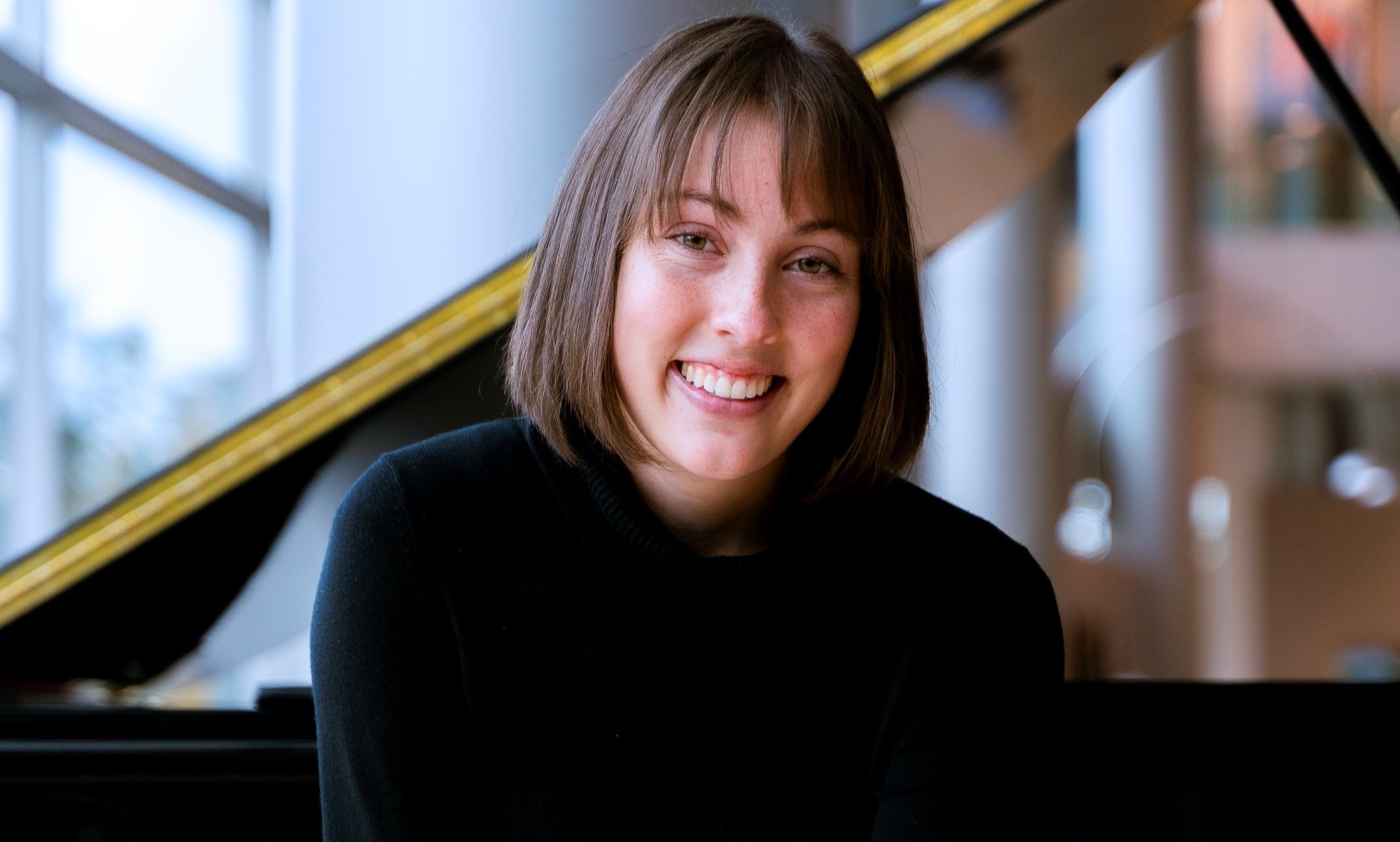
Piano student broadens horizons and creates lasting friendships while living in senior facility
When most college students walk into their residence hall, they are surrounded by other students their age. Beth Christensen is the youngest person in her residence – by about 50 years.
“I’ve always believed that the most important things about people are not the facts about them,” Christensen said. “The people here may be 50 or 60 years older than me, but that’s not essential to who they are as people. I’ve come to appreciate that even more with the relationships that I’ve created here.”
Christensen, a graduate student studying collaborative piano performance at the University of Missouri-Kansas City Conservatory, lives in Claridge Court senior living facility in Prairie Village, 15 minutes away from campus. In exchange for residency, she performs concerts and provides regular live music for the residents. Christensen moved into Claridge Court in July 2023 to spend a year there as the student-in-residence. In doing so, she allowed Claridge Court to deepen their commitment to intergenerational programming, making them the only retirement community in the area to have such a partnership.
“It’s really fun to have a relationship with your audience as a performer,” Christensen said. “In the beginning, I wouldn’t do anything too out of the ordinary – I would bring a vocalist sometimes, or I would play classical music. As I got more comfortable, I would try new things and play more recent music. Sometimes people wouldn’t like it, and they let me know. Others love to see where the future of music is going. It’s fun to be able to ask what kind of music people want to hear and work it into my repertoire.”
As part of her living arrangement, Christensen is encouraged to immerse herself in the community. From yoga and chair volleyball to eating dinner and visiting with neighbors generations older than her, she’s become a full-fledged resident of Claridge Court.
“I’m just part of the community, and it’s awesome,” Christensen said. “There’s a lot of special connections I’ve made. My friend Pat was an educator, and I’m a piano teacher. She has great ideas about how to help kids who are struggling, and I can always ask her advice. We do puzzles together, take walks and go to dinner. I tell her about shows I’m watching. She’s been a great friend, and she’s just one example. I feel so nurtured by these friendships.”
Christensen’s presence at Claridge Court is the result of a partnership between the senior living facility and UMKC Conservatory. This is one of the many partnerships in the community that Claridge Court has fostered, as part of their commitment to intergenerational programming and giving back in the community.
“Part of what distinguishes the UMKC Conservatory from other nationally recognized institutions is our deeply rooted connection to the Kansas City community,” said Courtney Crappell, dean of the UMKC Conservatory. “This collaboration demonstrates our ability to offer community-centered learning opportunities to our students as we leverage the power of the arts to positively impact lives.”
The partnership is supported by Claridge Court residents Charlie and Mary Kay Horner, who have been deeply involved with the Conservatory. The Horners were part of the process to bring this partnership to life, including choosing Christensen as the student-in-residence.
“We are absolutely thrilled that Beth has become such an integral part of our community,” Mary Kay Horner said. “Witnessing the connections she’s made with the residents is incredibly gratifying.”
As a performer, most of the audiences Christensen plays for are filled with strangers. When she performs at Claridge Court, her audience is full of familiar faces. The unique experience of playing to a room of friends is something she cherishes.
“Knowing my audience so personally is something I’ve never experienced before,” Christensen said. “It makes the music more special; it’s been a really cool experience to play for an audience that feel likes family. They really care about me as a person and a musician.”
Rob Salierno, executive director of Claridge Court, says that the benefits of Christensen’s presence extend far beyond her musical talents.
“This unique partnership enriches the lives of both our residents and Beth, fostering invaluable relationships,” Salierno said. “Her musical gifts, meaningful presence and interactions significantly enhance the quality of life for everyone involved.”
Andrew Granade, associate dean of the Conservatory, has helmed the partnership for the Conservatory. He believes the experience can be uniquely rich for the student-in-residence.
“As a UMKC student, you’re surrounded by a lot of people your age with similar goals and aspirations,” Granade said. “It’s such a rich learning experience to be out of that comfort zone and learn from people with life lessons to share and lived experiences that can expand your horizons in ways unimaginable.”
Christensen hopes her fellow residents at Claridge Court have valued the experience as much as she has.
“Music is such a connecting force. It bridges the divisions that exist between people,” she said. “Having the opportunity to make connections with a community that’s several generations older than me has been so special. These connections don’t make our differences go away, but it helps us really appreciate each other. It’s been such a beautiful experience.”
Apr 29, 2024
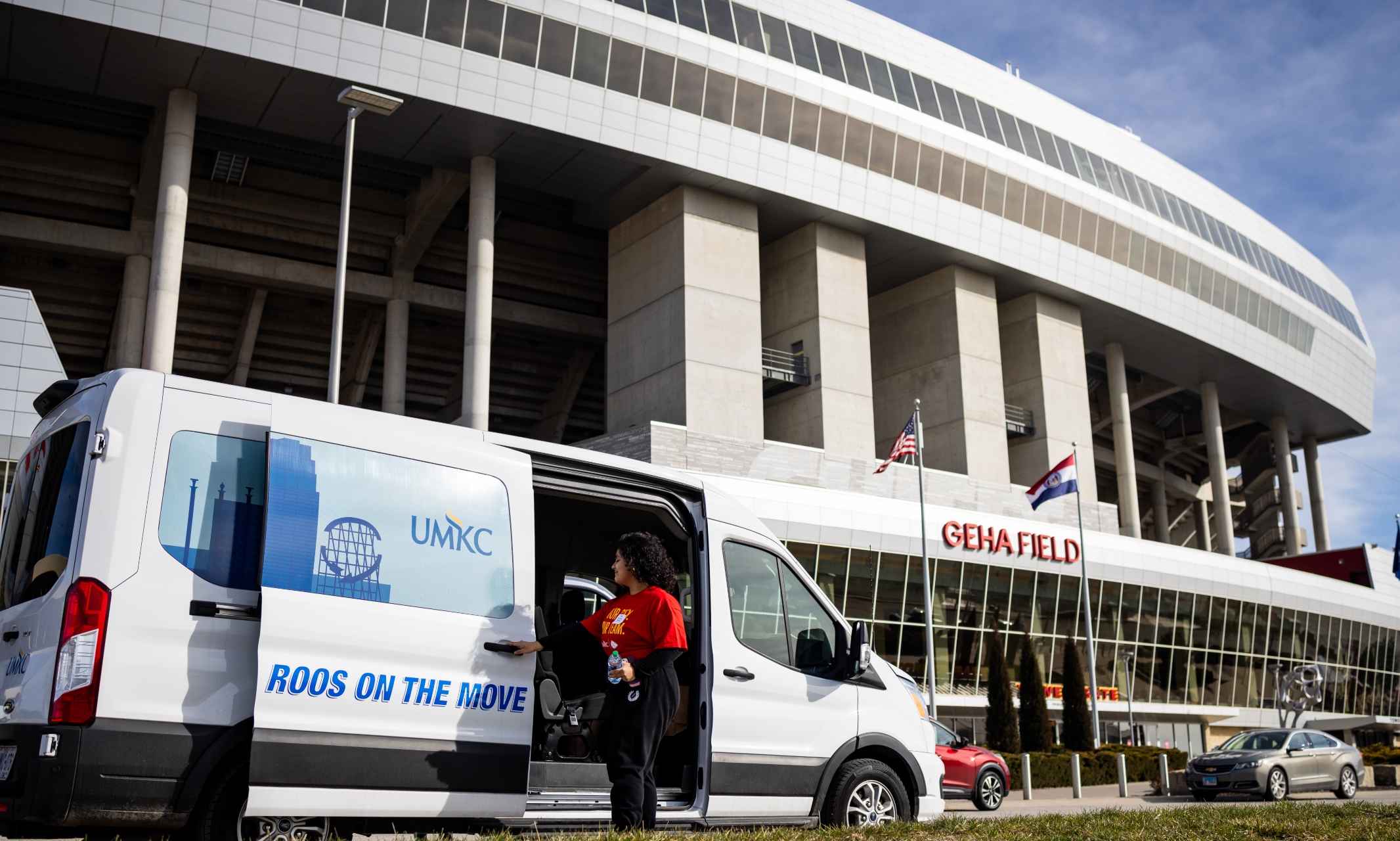
New UMKC partner scholarship focused on community
The University of Missouri-Kansas City has many great partnerships and resources to help its students succeed throughout their college experience and well after graduation.
As part of its five-year partnership with the Kansas City Chiefs, UMKC offers undergraduate students the Chiefs Kingdom Spirit Scholarship. The criteria include having a 2.75 high school GPA or a 2.0 transfer GPA. Applicants must write an essay on how they would give back to the Kansas City area community. This year’s 10 recipients, who will be featured at a Chiefs game in the 2024-25 season, are:
Arlin Carreon, business administration
Qasim Chohdry, six-year B.A./M.D. program
Kelly Fuentes, philosophy
Sumaya Geelle, business administration
Riley Harris, mechanical engineering
Alexia Jaime, biology
Nazish Khan, criminal justice and criminology
Lorenzo Pecina, civil engineering
Adeline-Corina Salomon, pre-nursing track for health sciences
Peter Stern, mechanical engineering
This scholarship means a lot to the students who receive it, including Salomon and Stern who were among this year's scholarship winners.
“This scholarship has made it easier for me to focus on school. I work two jobs to pay for school and at times it has been hard to have my full attention on school but with this scholarship, some of my financial stress has been lifted.” - Adeline-Corina Salomon
Stern is a freshman majoring in mechanical engineering. The scholarship offers an array of benefits, and for him, this scholarship helps him financially.
“I remember the night when I saw that the Chiefs scholarship had been credited to my financial aid account,” Stern said. “I was still in some disbelief that I had been selected for the award but was excited to know that my bill this semester had just been reduced by a significant amount. The Chiefs scholarship gave me the peace of mind that allowed me to focus on my studies.”
Winning this scholarship can encourage recipients to give back to the Kansas City community in ways they might not have been able to prior the scholarship. While grateful for his upbringing, being homeschooled did not bring Stern the academic references, scholarships or honor awards that he might have otherwise received in a public or private school district.
“Having the opportunity to pursue a degree in mechanical engineering at UMKC has been absolutely incredible, empowering me to dream bigger and brighter than I ever imagined,” Stern said. With the Chiefs’ victories and back-to-back Super Bowl wins, receiving the scholarship has made me feel more connected to the sport and even my city.”
Another recipient of the Chiefs Kingdom Spirit Scholarship is Salomon, a sophomore who is in the pre-nursing track for a Bachelor of Health Sciences degree.
“This scholarship has made it easier for me to focus on school,” she said. “I work two jobs to pay for school and at times it has been hard to have my full attention on school but with this scholarship, some of my financial stress has been lifted.”
Salomon has goals to help her hometown community after graduation, and this scholarship has made her dream of becoming a nurse much more possible.
“Having the opportunity to pursue a degree in mechanical engineering at UMKC has been absolutely incredible, empowering me to dream bigger and brighter than I ever imagined. With the Chiefs’ victories and back-to-back Super Bowl wins, receiving the scholarship has made me feel more connected to the sport and even my city.” - Peter Stern
“I’m proud to be from Kansas City and attend UMKC,” Salomon said.
With the Chiefs’ victories, it has made this scholarship that much more special to her and she holds lots of pride for the community and is very grateful for the scholarship and how UMKC and the Chiefs are giving back to the community.
More information on how to apply for the Chiefs Kingdom Spirit Scholarship, can be found on the UMKC Financial Aid and Scholarships website.
Apr 22, 2024
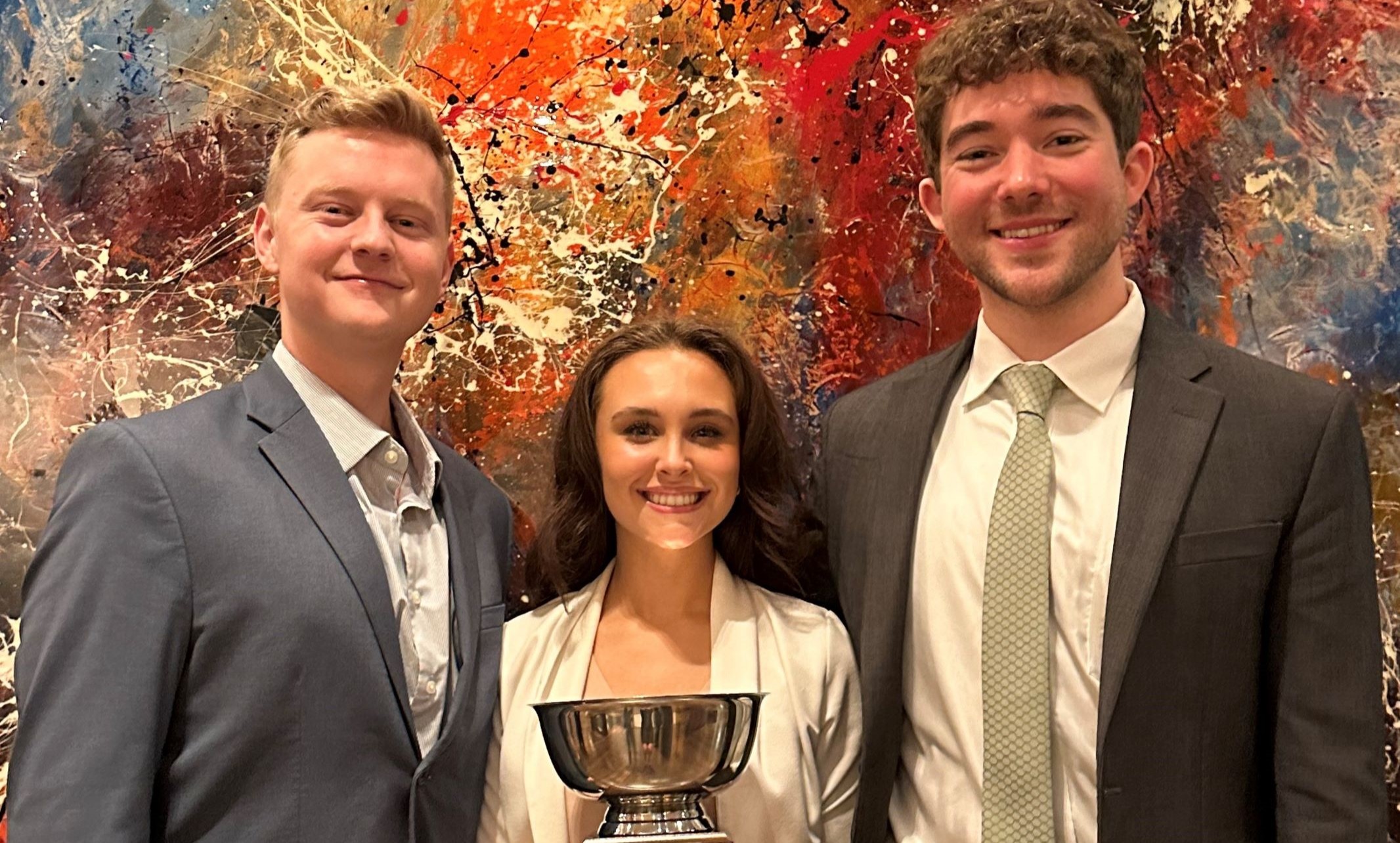
Team named a Top 4 team in the nation, student named best overall advocate
Two UMKC School of Law Trial Teams competed in the 2024 National Trial Competition. The team of Corbin Healy, Maddi Ilseman and Jacob Eisenhauer made it to the semifinals and ended as one of the top four teams in the country.
Corbin Healy was named the George A. Spiegelberg Best Overall Advocate of the competition.
“Being named Best Overall Advocate is an absolute honor,” Healy said. “I am beyond excited to end my Mock Trial career in such an incredible way alongside the best teammates in the country.”
More than 1,000 students from 140 law schools competed in this year’s competition, sponsored by the American College of Trial Lawyers and the Texas Young Lawyers Association. After both UMKC teams scored a perfect 5-0 in the regionals round, UMKC became one of only three law schools in the country to advance two teams to the national rounds in Houston, Tex.
Left to right: Martina Florido, Olivia Bess-Rhodes and Mattie Seley
Healy, Ilseman and Eisenhauer were joined at the national round by their peers on the other UMKC team, Olivia Bess-Rhodes, Martina Florido and Mattie Seley. School of Law professor L. Michaelle Tobin, J.D., coached both teams.
“I am so proud of the exceptional performance of our trial teams at this year’s competition, Tobin said. “Both teams demonstrated remarkable skill and preparation, earning them a well-deserved place among the top 30 teams from across the nation. These accomplishments reflect the high caliber of legal education at UMKC Law and our commitment to nurturing future leaders in the legal field.”
Apr 19, 2024
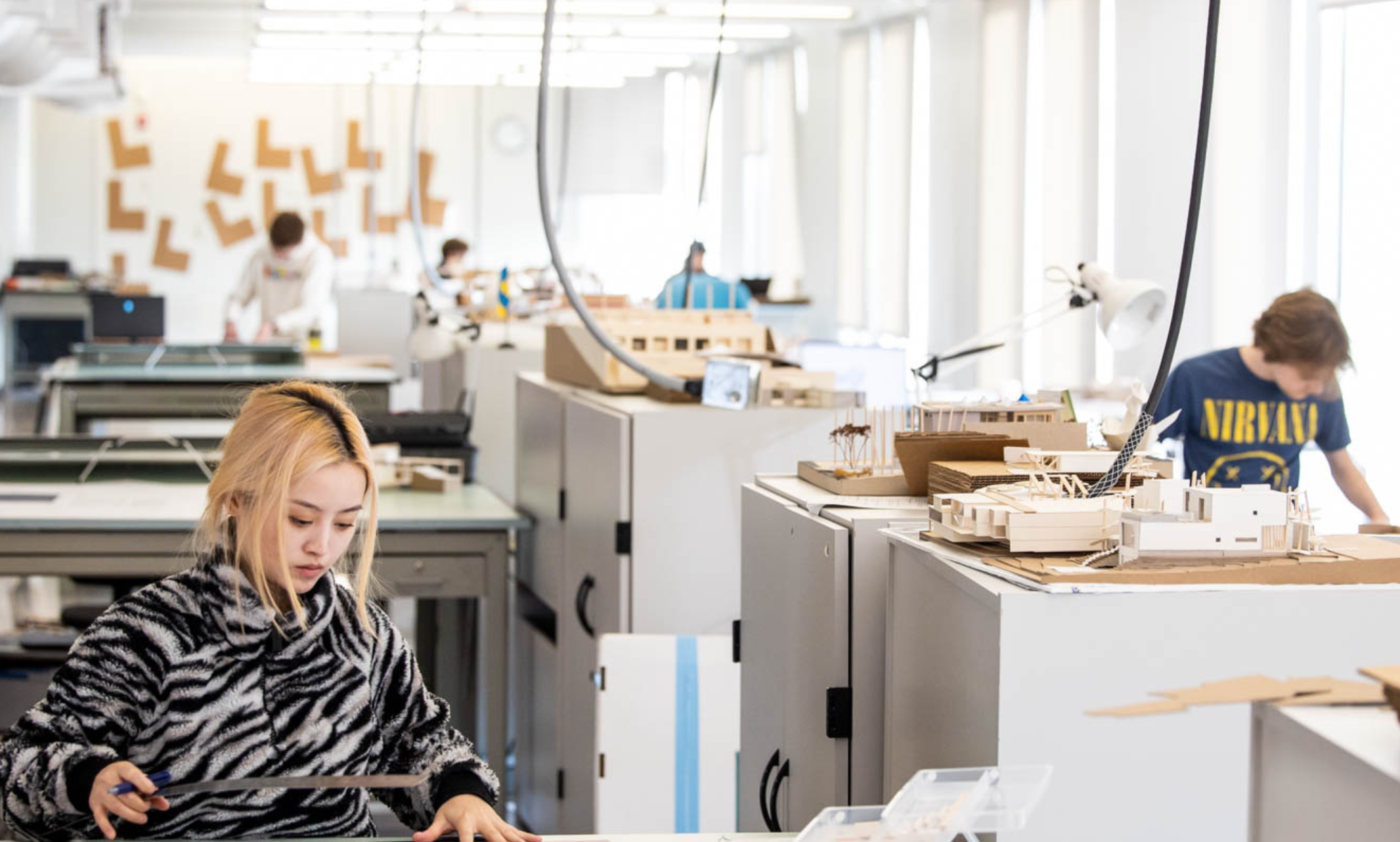
First public university in Missouri to offer a Bachelor of Architecture degree
The University of Missouri-Kansas City will launch a Bachelor of Architecture program this fall.
The UMKC Bachelor of Architecture program will be a five-year undergraduate degree program housed in the School of Science and Engineering. It will include courses, studio work and internships with various architectural firms in Kansas City. As part of their coursework, students will also have access to industry-grade equipment at the UMKC Innovation Studio for rapid prototyping their designs, alongside many Kansas City architectural firms that also use the facility.
This new bachelor’s degree offering joins a current joint architecture program, in which students start coursework at UMKC and transfer to Kansas State University to complete a Master of Architecture. Among the benefits of the new program is that UMKC students will get to complete their full degree in Kansas City, a metropolitan area rich in career opportunities.
“We are excited to provide students the ability to pursue architecture and design in a city that’s known for its local and global architectural projects, allowing our students to have real-world experiences in their educational program,” said Kevin Truman, dean of the UMKC School of Science and Engineering.
The program is the first of its kind in the state of Missouri and has strong industry support. Kansas City architectural firms Focal Design Studio, SLATTERY Design + Architecture (formerly Odimo Architects), Populous, Multistudio, Burns & McDonnell and DRAW Architecture + Urban Design signed letters in support of the program. These prominent firms have worked on major Kansas City developments, such as the Kansas City International Airport, Children’s Mercy Park and Rock Island Bridge. There’s also an international profile from these Kansas City architecture firms, such as Super Bowl, FIFA World Cup and Olympic Games venues.
“It is an honor to have the support of local architectural firms as we launch this program at UMKC,” Truman said.
Dawn Taylor, executive director of the American Institute of Architects in Kansas City, said the benefits of the offering an architecture program in Kansas City are far reaching.
“Expanding the opportunities at UMKC for students to achieve an architecture degree is exciting and positive, as it offers students an affordable and accessible option to earn their degree,” Taylor said. “Our chapter wants to see more students, especially from our region, choose careers in architecture and design to increase the talent pipeline for all of our firms.”
Faculty from the architecture, urban planning and design program are also excited about the new degree offering.
“As a former student of the UMKC architectural studies curriculum, I am happy, proud and honored to be a part of the new UMKC Bachelor of Architecture program,” said Dominic Musso, a UMKC architecture instructor who will teach in the new program. “Kansas City is an international hub of world-class architectural firms, and having a degree program to provide new graduates to that market is a natural fit. Kansas City’s rich historic character and urban environment provides the ideal backdrop for students to become the next generation of our city’s architects.”
Apr 16, 2024
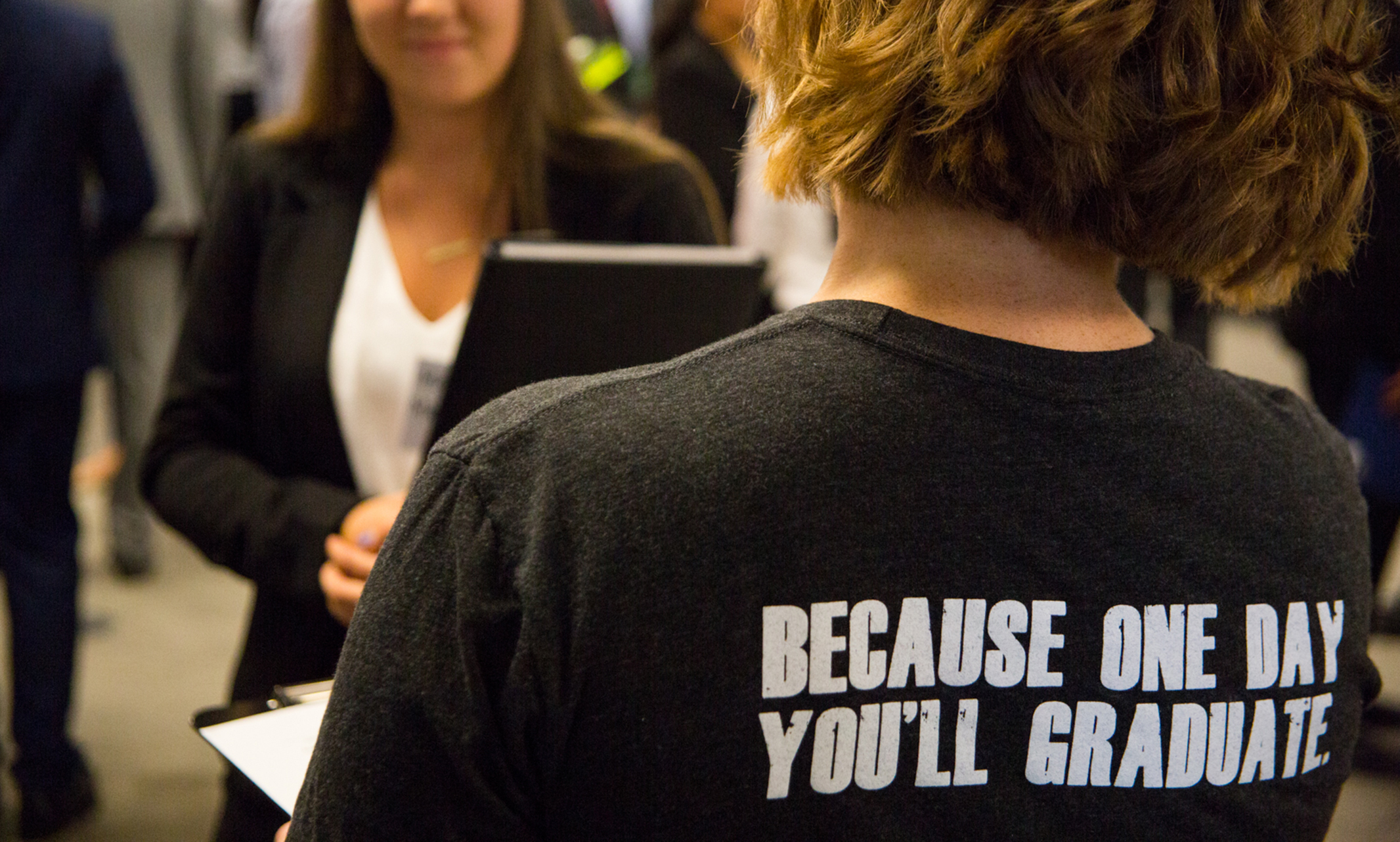
Grant will fund local internships in the humanities to prepare students in their chosen field
The Andrew W. Mellon Foundation awarded UMKC $5 million to fund humanities internships that will support the UMKC School of Humanities and Social Sciences, students and the local community.
Funding from the Mellon Foundation’s Higher Learning Program will formalize and standardize an internship program that places more than 180 students in paid internships for the length of the grant. While internship stipends will be reserved for nonprofit organizations and research teams, small businesses and corporations will be able to participate as hosts by providing 50% or more of the of the student stipend.
The co-principal investigators on the grant are Diane Mutti-Burke, Professor of History and Jeff Rydberg-Cox, of English and Classics. They are both co-directors of the Center for Digital and Public Humanities at UMKC. Tamara Falicov, Ph.D., dean of the School of Humanities and Social Sciences, is also a principal investigator.
Connecting students to internship opportunities is a high-impact practice correlated with increased student persistence, degree completion and post-graduation career success. Research shows students who participate in internships gain personal and professional development, including building interpersonal skills such as teamwork and communication.
“The UMKC School of Humanities and Social Sciences is thrilled to be the recipient of a Mellon Foundation grant to support Internships for undergraduate students in the humanities,” said Falicov. “This grant is coming at a critical time for students who cannot afford to enroll in unpaid internships. Thanks to the Mellon Foundation, students can apply their humanistic training within a community setting while earning a stipend. They will gain valuable skills, explore new career paths and simultaneously contribute to the success of a research project, small business or nonprofit organization in Kansas City and beyond."
The $5 million from the Mellon Foundation includes $4 million in expendable funds over five years and $1 million for endowment to support the program beyond the initial grant period. Interested humanities majors and internship providers may inquire for more information by emailing Jenni Frangos, Ph.D., Mellon internship director at frangosj@umkc.edu, Sandra Enríquez, Ph.D., Mellon internship associate director at enriquezs@umkc.edu or Anabeth Laaker, Mellon internship coordinator at aclaaker@umkc.edu.
Apr 16, 2024
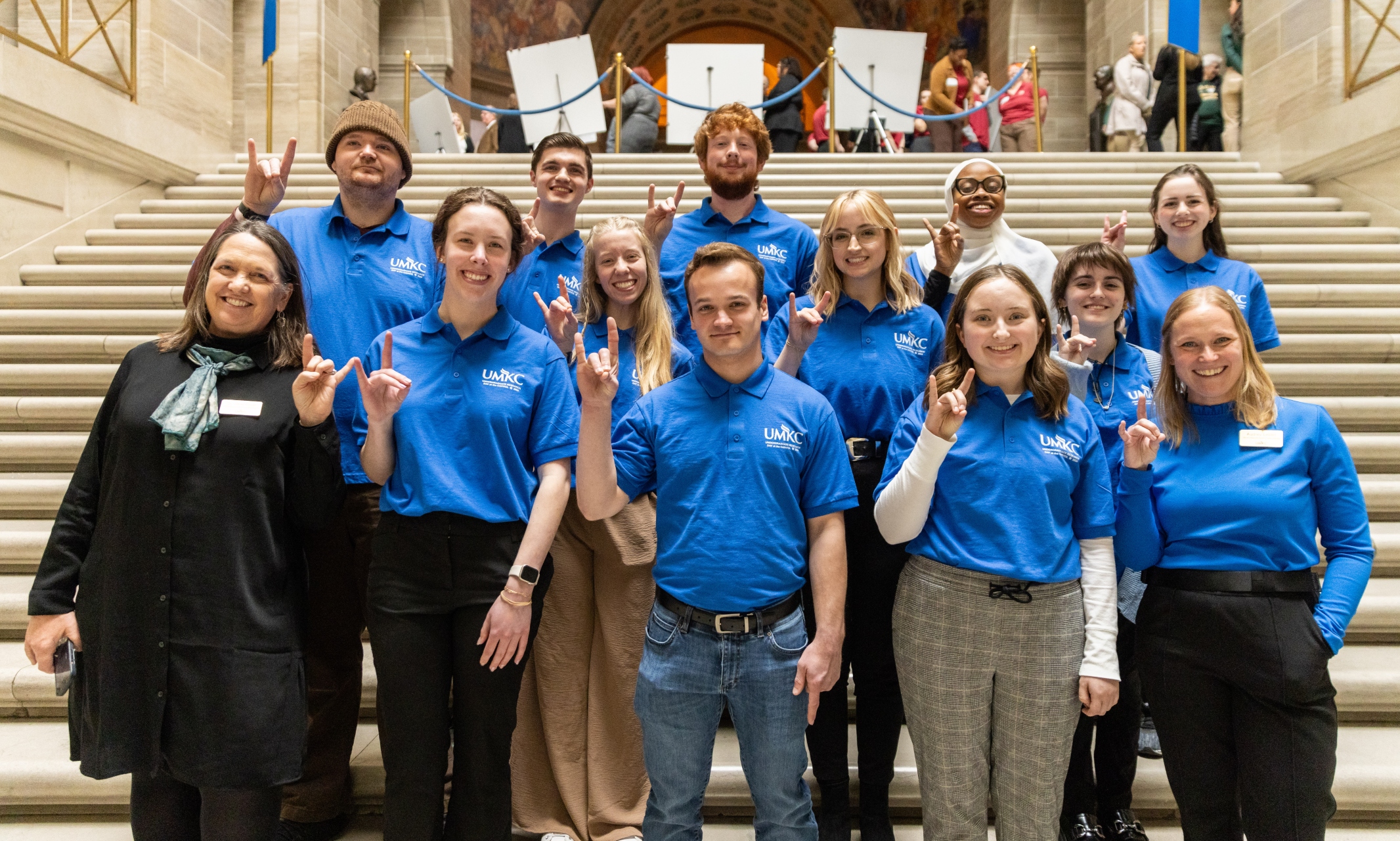
UMKC students presented their research on hearing loss, ACL injuries, music complexities and more
Each year, undergraduate students from all four UM System schools go to Jefferson City, Missouri and present their research in front of elected officials at Undergraduate Research Day at the Capitol. University of Missouri-Kansas City students who presented are from the Conservatory, School of Humanities and Social Sciences, School of Science and Engineering and the School of Nursing and Health Studies
Research: The Urban Heat Island Effect: Creating an Interactive Model.
Sophia Baugher is a junior from Independence majoring in earth and environmental science.
Baugher's investigation of how natural and manmade surfaces impact the Urban Heat Island Effect has led her to develop an interactive model for educational purposes.
The Urban Heat Island Effect is a phenomenon that affects metropolitan centers across the entire world. With the recent trend of rising temperature thanks to climate change comes an increased risk in heat borne illnesses, and even an increased risk of heat-related death.
Baugher’s Urban Heat Island model involved a model city being crafted from 3-D-printed materials, real roofing and asphalt samples and plants and trees that also show the affects that can mitigate this phenomenon. The project also utilizes a FLIR C5 thermal camera that will be used to demonstrate the temperature effects in real-time, as directed by the user.
Research: Foxg1a is required for hair cell development and regeneration in the zebrafish lateral line
Emily Bledsoe is a junior from Overland Park majoring in biology.
In the human inner ear, hearing and balance are mediated by specialized sensory cells, called hair cells. When damaged, these hair cells cannot regrow, resulting in deafness and balance disorders. In the state of Missouri, one in ten Missourians experience hearing loss or deafness, meaning there is a large population who could benefit from research into hair cell biology.
Aquatic animals, including zebrafish, have specialized hair cells used in their lateral line systems to sense water current. These hair cells are very similar to the inner ear hair cells in humans, but unlike human hair cells, these lateral line hair cells can regrow throughout the lifespan of the fish.
Bledsoe is investigating the foxg1a gene, which is important for inner ear development, and determining if it also plays a role in hair cell development and regeneration in the zebrafish.
Research: Circadian Regulation of Spt Ada Gcn5 Acetyltransferase (SAGA) in Drosophila Melanogaster
Chris Ekengren is a senior from Raytown majoring in biology.
Austin Evans is a freshman from Neosho majoring in biology.
Together, Ekengren and Evans are tracing enzymes in the brain to learn how they affect the dynamics of circadian regulation and its related neurodegenerative diseases.
Spinocerebellar ataxia type 7 (SCA7) is a disease which leads to the degeneration of the retina and cerebellum, causing neurodegeneration, blindness and loss of motor skills. Following the ATXN7 gene, to the Ataxin7 protein, to the transcriptional cofactor called SAGA which is critical for gene expression, Atxn7 polyQ may disrupt the balance bound and free non-stop causing dysregulation.
Ekengren and Evans aim to investigate the dynamics of circadian regulation of SAGA and non-stop in the brain and how their dysfunction may lead to disease.
Research: Unveiling Urban Trauma: The Impact of Design on Community Well-Being
Maryam Oyebamiji is a senior from Kansas City majoring in urban planning and design.
Through her research on community development design, Oyebamiji has discovered how trauma-informed design can promote well-being in diverse populations.
Design is a powerful force that shapes the physical and social fabric of our communities. When wielded responsibly, it has the potential to uplift and enrich the lives of individuals, fostering a sense of belonging and well-being.
Design negligence, a term gaining prominence in contemporary discourse, encapsulates the unintended consequences of ill-informed or negligent design decisions. In the context of community development, design negligence not only fails to address the unique needs and aspirations of diverse populations but can also actively enforce trauma, perpetuating cycles of inequality and marginalization.
Research: Exploring the Molecular Links Between Circadian Rhythm and Neurodegeneration
Sydney Rogers is a sophomore from Blue Springs majoring in health sciences.
Anna Shaw is a sophomore from Independence majoring in biology.
Together, Rogers and Shaw are studying sleep patterns in fruit flies and investigating how loss of sleep affects proteins in the brain. Researching these effects can help us understand the health problems related to sleep deprivation.
Sleep quality is important for every dimension of mental and physical health, and numerous analyses show a correlation with sleep loss and disease. The circadian rhythm is a 24-hour internal biological clock that bodily proteins rely on to determine their level of activity throughout the day. Disruption of this internal cycle causes circadian dysfunction which can be correlated with the onset of a wide spectrum of neurodegenerative diseases such as Alzheimer’s and Parkinson’s.
Rogers and Shaw’s research identifies sleep patterns using behavioral to investigate how loss of sleep disrupts ubiquitination patterns. SAGA is a protein complex that harbors the deubiquitinating enzyme Non-stop. Non-stop is shown to participate in the regulation of the circadian rhythm and could be a key factor in understanding the effects of sleep disruption.
Research: Physical Activity, Sleep, and Demographic Patterns in Urban Missouri Youth: A Quasi-Experimental Study
Olivia Sours is a senior from Independence majoring in nursing.
With data collected from accelerometers worn by adolescent youth, Sours is looking for correlations between physical activity levels and sleep patterns. In her research, Sours utilizes Garmin VivoFit4 health tracking wrist-worn devices to monitor sleep time and daily step counts in her primary focus group of adolescents in Kansas City Public School systems.
Connections between sleep and physical activity are vital components of growth and development, especially in adolescence. Lack of adequate sleep and sleep quality has been known to affect mood, school performance, as well as health in general.
Middle school students in urban areas also face complexities that may cause increased complications in sleep and physical activity, calling for a comprehensive intervention approach that allows students to engage in physical activity safely and learn about how to take care of themselves with productive strategies.
Research: The Humorous Disability Rhetoric of Jess Thom
Emily Stauffer is a senior from Kansas City majoring in English.
Stauffer's rhetorical analysis of comedian Jess Thom aims to show how humor can educate and promote understanding of disabilities. Thom was diagnosed with Tourette’s Syndrome in her early 20s, and now in her 40s, is working to break down barriers for people with disabilities.
Tourette’s Syndrome is a neurological condition that causes tics, which are sudden movements or sounds a person makes and cannot control. Tourette’s is extremely common, yet still a highly stigmatized condition.
Stauffer’s work focuses on Thom’s use of humor to educate her audiences on her disability and promote understanding.
Research: Characterizing Lava Flow Behavior Using Digital Models of Small Tubes from Flows at Askja, Iceland
Mya Thomas is a junior from Columbia majoring in earth and environmental science.
The low-cost photogrammetry technique that Mya Thomas developed to create digital models of small lava tubes from flows at Askja Volcano in Iceland has wide applications, from modeling caves in Missouri to modeling geographic features on the moon.
Caves are a large part of Missouri’s natural heritage and the state’s tourism. Creating digital models of geologic features using this photogrammetry technique increases accessibility and enables detailed study of their characteristics.
Research: A Perfect Tuning System?
Brady Wolff is a senior from Lake Winnebago majoring in music composition and music theory.
Wolff has developed a new visual aid to represent the complexities of musical pieces composed with a "just intonation" tuning system. This tool not only provides theoretical insight into modern compositions, but also has implications for music education.
Research on just intonation explores the practical applications of pure harmonic ratios in composed music, fostering innovative harmonic possibilities. Current research delves into the tuning systems utilized by specific composers but lacks a comprehensive overview for individual compositions.
To address this gap, Wolff developed a visual aid capable of displaying the tuning center, harmonic reach, and harmonic complexity of numerous compositions composed with just intonation. Inspired by the lattice structures employed by Ben Johnston, Wolff’s visual aid provides insight to other notable composers, including Catherine Lamb and Sean Archibald (Sevish).
Research: The Growth Plate and Its Role in Youth ACL Injuries
Isaac Woodward is a junior from Riverside majoring in mechanical engineering.
The anterior cruciate ligament, or ACL, is a ligament in the knee joint that is commonly injured during athletic activities. ACL injuries often have long recovery times and can cause lifelong knee problems. Using computer modeling, Isaac Woodward's research seeks to understand the role that the adolescent growth plate plays in ACL injuries.
Recent research has shown that, from the ages of 14-18 in particular, female athletes are much more likely to suffer an ACL injury than male athletes. One possible cause of this trend is the adolescent growth plate: a soft, cartilage-like segment in an adolescent’s leg bones that allows the adolescent leg to grow until it reaches maturity, at which point the growth plate hardens into bone. Due to the softer, springier properties of the growth plate, some have hypothesized that the growth plate may act as a shock absorber for the knee.
Because the female growth plate hardens into bone several years earlier than in males, such a shock absorbing effect of the growth plate may explain this strange spike in teenage female ACL injuries.
To investigate the role of the growth plate in ACL injury, Woodward used computer modeling software to create two software models of the same knee joint: one with a growth plate and one without. Tests were then run on these two models to investigate the impact of the growth plate on ACL stress. The test results indicate that the growth plate does have a shock absorbing effect on the ACL in certain modes of knee loading, thus offering a potential explanation for this strange trend in adolescent ACL injuries.
Apr 15, 2024
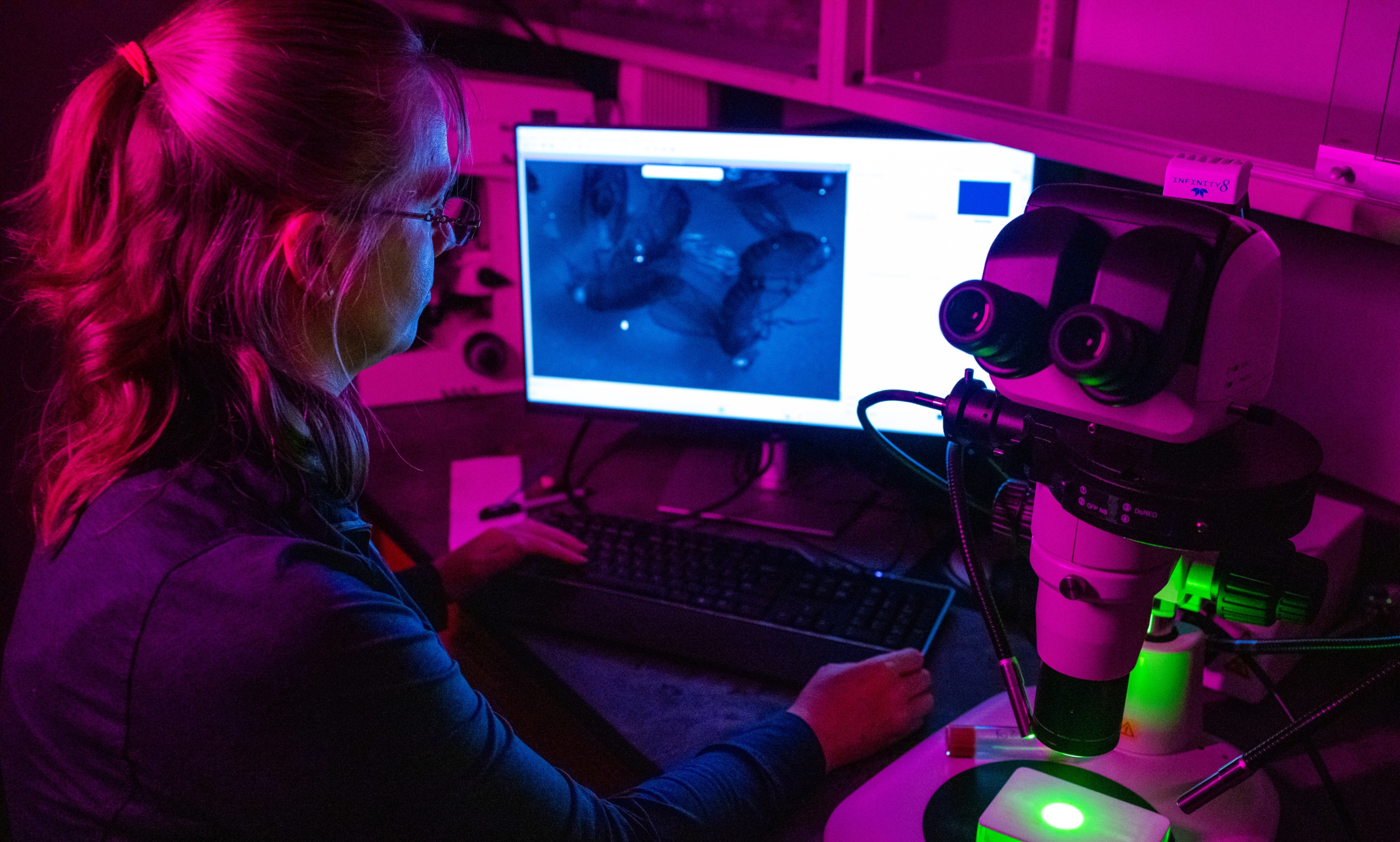
Investigating fruit flies to learn about the progression of myotonic dystrophy
Talk about significant research. UMKC Assistant Professor Maria Spletter’s biology lab is investigating the breakdown of proteins in the body that lead to chronic conditions such as cancer and heart disease. She has lasered in on myotonic dystrophy — or loss of muscle function.
Myotonic dystrophy is among the most common rare diseases, estimated to affect 1 in 2,100 births. The muscle disease also causes accelerated aging as the regulation of ribonucleic acid — present in all living cells and also called “RNA” — changes and alters muscle control, growth and contraction.
Spletter selected a model that is insignificant in size but significant in efficiency: the fruit fly Drosophila.
Why Drosophila?
“Drosophila are a very powerful genetic model,” Spletter said. “This means that there are a lot of tools available in the fly that enable us to do experiments that are not possible in mice or rats or humans. Plus, Drosophila grow quickly from an egg to adult fly in 10 days, so you can follow each step during development in a matter of weeks instead of years.”
Another benefit of using Drosophila is the muscles it has are highly conserved, meaning the proteins that build muscles, how muscles contract and the structure and organization of muscles are the same in flies as they are in humans. In fact, models of human disease in flies reveal the same mechanism and same muscle type. These flies, therefore, provide a useful model to understand the basic mechanisms and defects in the muscle that result from a disease-causing mutation, so that further studies in human cells can be targeted.
This means the team can look at the developmental mechanisms that lead to loss or damage to muscle fibers during a time point that is impossible to study in detail with mammals. By tracking the initial stages of muscle fiber during development, they can tell exactly which steps in the assembly process are defective. Studies in mice or rats typically do not have this level of resolution and have not focused in detail on how the structure of the muscle is disrupted.
Testing With High-Powered Tools
“We test muscle function to measure how well flies can fly, jump, climb, flip themselves over after falling on their back and how quickly they are able to clean themselves after being dusted with a fluorescent powder,” Spletter said. “All of these give us insight into live flies on their behavior when it comes to how well their muscles work.”
To investigate the function of these RNA-binding proteins on the cellular level, the lab labels the tip of the muscle with a fluorescent marker and watches the muscle move using a microscope. They then quantify the movement by measuring how often the muscles contract, how much they move when they contract and the dynamics of the contraction. This is where contraction is usually impaired and irregular in mutant flies.
The researchers then use a high-powered microscope that utilizes lasers to image samples to look at muscles that are stained and label different components. Unlike a traditional microscope, the laser allows us to image single planes that are 1 micron or less thick (a fruit fly is about 1 millimeter thick, and there are 1,000 microns in 1 millimeter). An indirect flight muscle cell is around 100 microns thick, so at least 100 pictures of different planes in the muscle can be taken to see all the structures inside it.
With the lab’s microscope having four different lasers, four different components of the cell can be viewed at the same time to see where they are located relative to each other. With the mutants in particular, the team can observe how their localization has changed. This allows comparison between mutant and control flies to see how the structure is different in the mutants on a cellular structural level.
The team then takes tissue samples from control and mutant flies to molecular and biochemical testing to find out what genetically changed in the mutant muscles, subsequently linking molecular defects to changes in cellular structure as well as muscle function.
This is usually when mRNA-Seq, a combination of a biochemistry and bioinformatics approach, takes place. The mRNA (coding blueprints that are turned into proteins in the cell) from the fruit fly is isolated and the lab sequences every single gene and gene variant expressed in the muscle cell. Typically, there are around 6,000 to 8,000 genes expressed at any time, and if you look across development, around 10,000 genes change expression. The data is usually viewed for individual genes, individual splice events within one gene, or globally at all the changes in gene expression and splicing. The various levels of data obtained allow the lab to understand on a systems level what has changed in the mutant muscle cell in comparison to the control, and on an individual gene level to identify targets that might explain specific pieces of the phenotype we see.
Spletter’s lab also conducts mass spectrometry, an analytical tool useful for measuring the mass-to-charge ratio of one or more molecules present in a sample, to isolate the proteins from muscle cells and determine the identity of most of the proteins present in the muscle. Around 4,000 proteins are typically detected, but more sensitive machines can see up to 6,000 proteins. This analytical method provides information on which proteins change in our mutant muscles and allows the comparison of the protein changes in the RNA from the mRNA-Seq data and to find out exactly how changes in RNA regulation lead to defects in muscle fibers and structure.
The Discoveries
Recent research findings from Spletter’s lab, which were published on bioRxiv, revealed how the characteristics in mutant muscle are a domino effect. The small things that go wrong at each step in the muscle development lead and further heighten the effect on the muscle. This leads to greater disruption on the muscle, compared to when Bruno1 mutant is added to the later part of muscle development.
From the same research findings, Spletter’s lab discovered the potential possibility of testing gene therapy strategies in the flies that are currently in development for possible use in human patients.
Although gene replacement therapy can “normalize” patterns of splicing, patients only have a partial improvement of symptoms. This means that gene therapy usually improves quality of life, and will likely extend life expectancy, but is not a cure.
Spletter’s lab was able to gain insight into why exactly this is the case.
“Because the structure of the muscle has defects in the core mechanical structure that allows it to move, just fixing the splicing pattern is not sufficient to fix those defects,” Spletter said. “This suggests that we need better detection methods to find patients before they seek medical help, as the earlier a gene therapy can be administered, the better chance these patients are going to have of maintaining muscle function.”
Apr 11, 2024
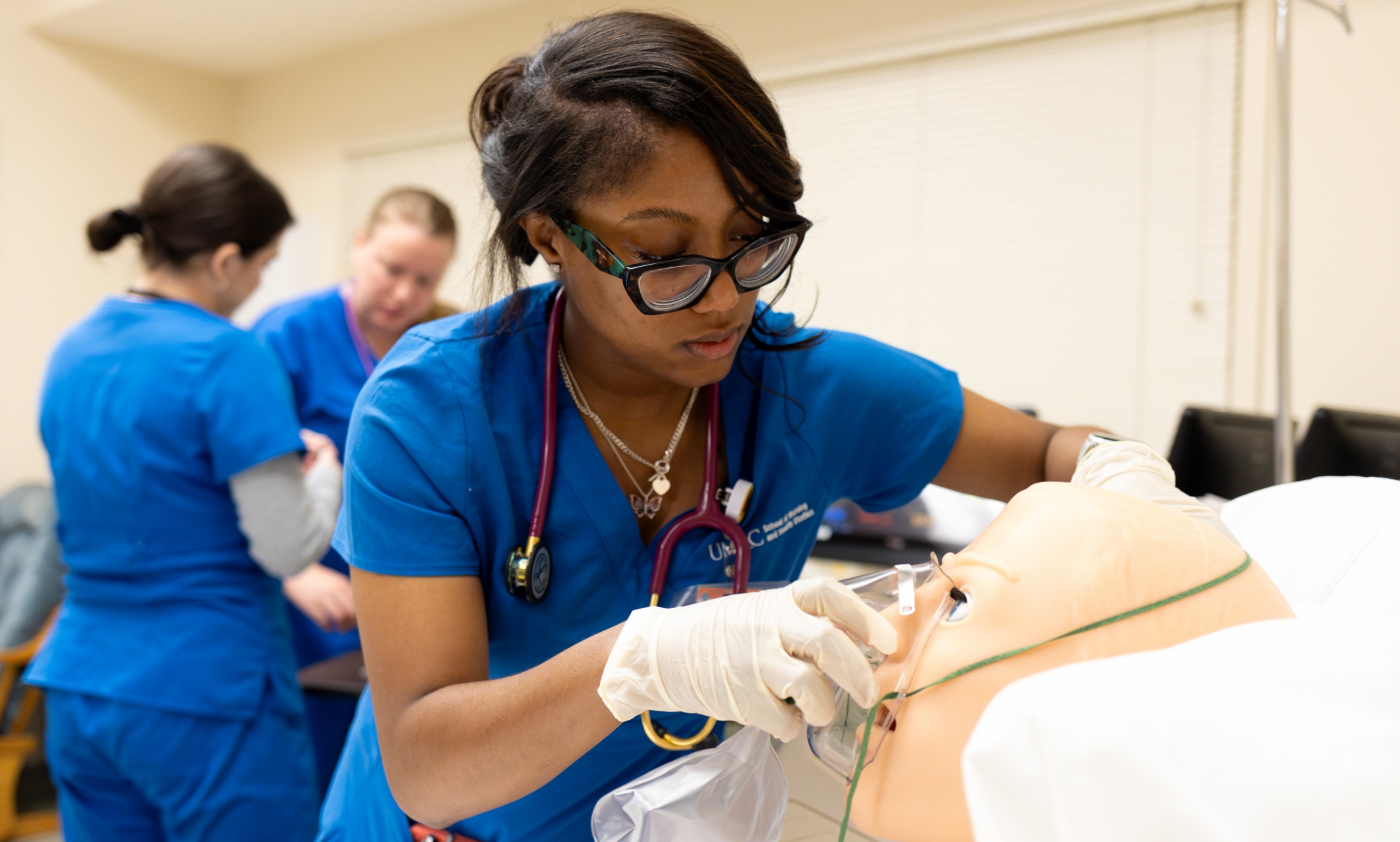
Programs are Doctor of Nursing Practice, Doctor of Pharmacy and legal writing
Three UMKC graduate school programs were ranked among the top 40 in the nation in the rankings released today by U.S. News & World Report, with 10 programs ranked in the top 100.
The Doctor of Nursing Practice program in the School of Nursing and Health Studies was ranked 19th in the nation, out of a total of 156 ranked schools. The program ranked 49th in the nation last year.Rankings for other Doctor of Nursing Practice programs in the region included University of Missouri (34th), University of Arkansas for Medical Sciences (45th) and Saint Louis University (97th ).“Our Doctor of Nursing Practice program has been well-respected nationally and highly ranked for decades due to the work of our faculty, staff and especially our students,” said School of Nursing Dean Joy Roberts J.D., M.S.N., APRN-BC. “We take pride in our programs, and our graduates offer high-quality care and education to the people of Kansas City and across Missouri, as well as people across the United States.” The Doctor of Pharmacy program in the UMKC School of Pharmacy ranked 31st in the country.“We very much appreciate this great recognition for all the hard work and successes that our students, staff and faculty produce and achieve every year,” said Dean Russell Melchert, Ph.D., R.P.h. “This is an opportunity for all in the nation, and particularly future students here in Missouri and the greater Kansas City area, to see what great opportunities lie ahead for those who would like to join our Roo pharmacy family.”The UMKC Schools of Pharmacy and Nursing and Health Studies are located in the UMKC Health Sciences District, a walkable campus where all UMKC health profession schools are located alongside a dozen health-care institutions. The location allows for interdisciplinary work among health professions and nearby clinical and research opportunities. Each year, UMKC students gain real-world experience and provide crucial services to the Kansas City community through community programs like Our Healthy Jackson County and community health clinics. The UMKC School of Law ranked in the nation's top 50 in two sub-specialty categories: legal writing (16th) and trial advocacy (48th).“We’re thrilled that these rankings show what we know to be true, that UMKC School of Law is an excellent place to get a legal education,” Dean Lumen Mulligan, J.D., M.A., said. “Strong legal writing is the foundation of a career in law, and we focus on it from day one. Students use these skills to excel in their chosen specialties. One of the best examples is the success of our trial advocacy program. Our student trial advocacy teams are some of the best in the country due to their exceptional lawyering skills.”In addition to coursework, the UMKC School of Law is uniquely situated to provide robust practical experiences to its students. Students have access to experiences in Missouri and Kansas, with two state courts of appeal, two federal district courts, eight county courts and seven municipal courts nearby, in addition to multiple community clinics and internship opportunities where students can assist real clients under the supervision of licensed attorneys.
Apr 09, 2024
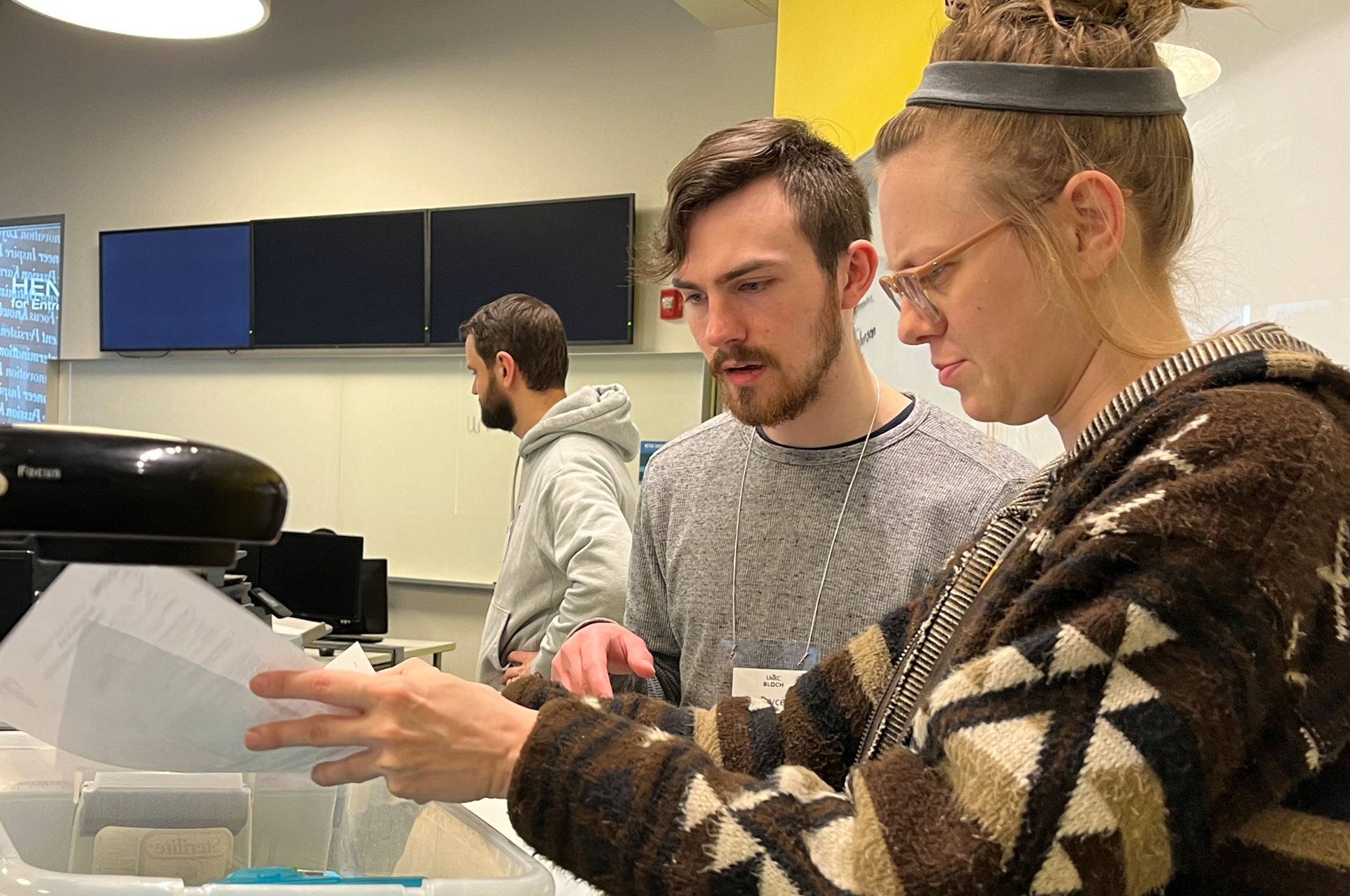
Bloch students serve the Kansas City Community at Voluntary Income Tax Assistance clinic
For more than five years, the University of Missouri-Kansas City has served the community through the federal Volunteer Income Tax Assistance program which helps individuals with low-to-moderate income, people with disabilities, the elderly and those who speak limited English file their taxes.
The VITA program was founded in 1971, and currently has 10 sites around the Kansas City area, including the UMKC location, and more than 3,200 sites around the United States. This tax season for the first time, Henry W. Bloch School of Management students have been able to earn college credit for helping people at the UMKC VITA site.
“This ensures all volunteers meet an advanced level of proficiency and ensures that there are a consistent number of volunteers at the site for the duration of tax season,” said Kimberly Luken, assistant teaching professor of accounting at Bloch.
The VITA Tax Program offers hands-on experience, something Bloch accounting student Bryce Hort has used to his benefit. Hort has had the opportunity to serve as the VITA site coordinator in Tulsa, Oklahoma and Kansas City over the past few years. He calls the experience fulfilling.
“There's something so gratifying about being able to see the fruits of your labor nearly instantaneously in the form of the tax refund numbers that appear when preparing a return,” Hort said. “You truly feel like you're making a difference in that moment, which motivates you to continue.”
Hort has also been able to get real-world experience while participating in this program and walk away with skills that will help him after graduation.
“I've had the opportunity to be involved in the processing of hundreds of tax returns, all before I even graduate with an accounting degree,” Hort said. “Not only is this an excellent resume builder, it's also an excellent confidence builder. Once I enter the workforce with my degree, I will already have a distinct advantage in terms of confidence and familiarity with tax law and the tax preparation process.”
There are 18 students taking the course for credit this year as well as 20 community volunteers. Luken said the program offers many benefits to students including peer-to-peer mentorship.
“As a professor, what I find most impressive is the welcoming environment the students create, their professionalism, their commitment to make sure they do it right, their willingness to learn and above all, the respect they show our taxpayers,” Luken said. “These students work directly with the taxpayers. This requires an incredible amount of patience, compassion and effective communications skills.”
Last year, the UMKC site prepared about 180 federal returns. The goal for them this year was to double that number, something they easily achieved, completing over 400 federal returns totaling more than $427,000. The team has also completed nearly 500 state returns, totaling more than $138,000.
Luken’s goals for the UMKC VITA program include growing the number of students taking the course, maintaining a ratio of 50/50 student volunteers and community members.
“I want our clients to know they can count on UMKC to be here for them.” Luken said.
If you are interested in volunteering either at UMKC or another site, you can email Luken at kimberly.luken@umkc.edu.
Apr 09, 2024
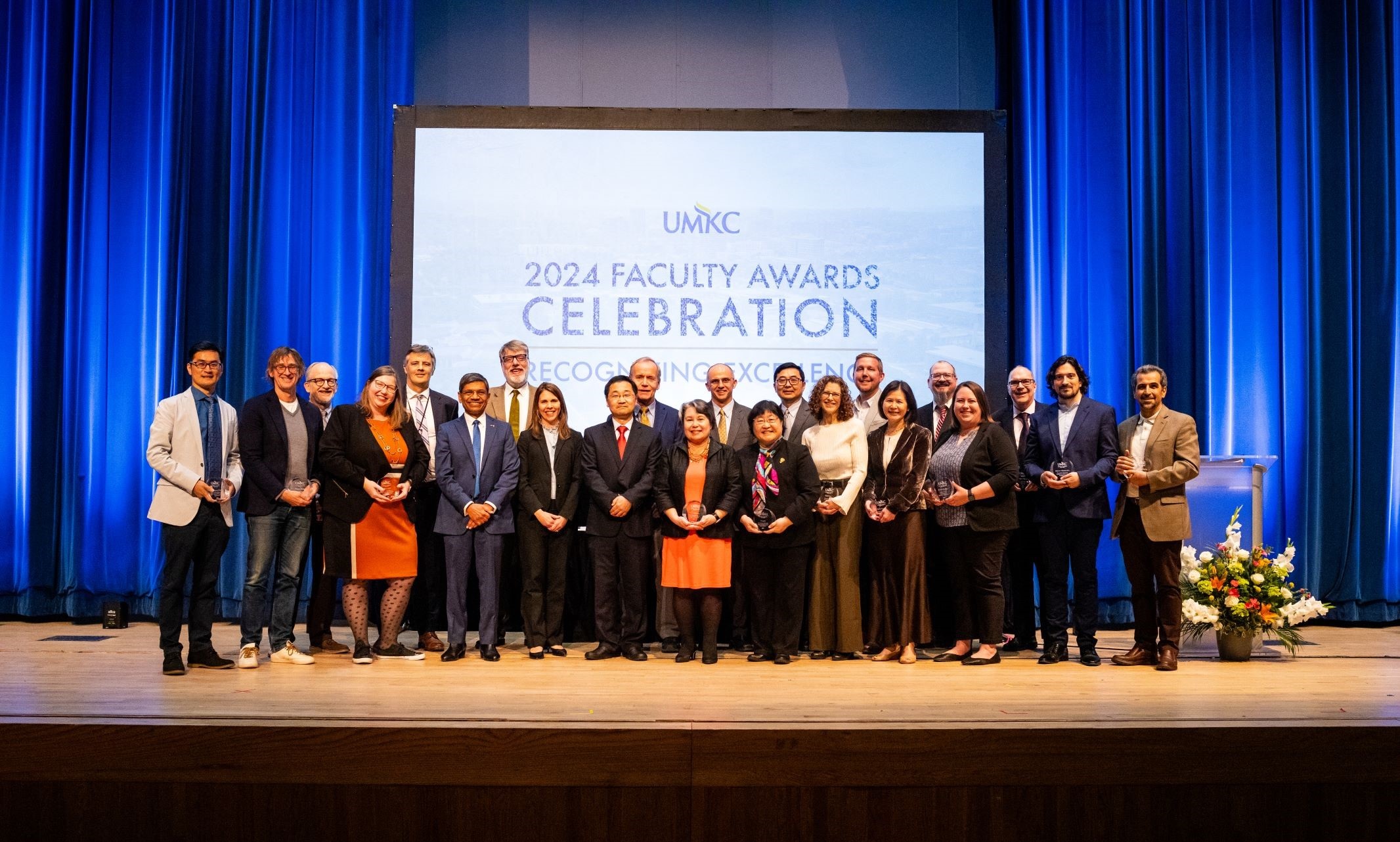
Annual Faculty Awards honor excellence in teaching, leadership, research and more
The University of Missouri-Kansas City recognized more than 20 faculty members across the university in the 2024 Faculty Awards celebration. Awards were given for research and scholarship, teaching and mentorship, diversity, engagement, service and leadership.
The ceremony began with remarks from Provost and Executive Vice Chancellor Jennifer Lundgren who shared her appreciation for the faculty at UMKC.
“Your contributions and success reach beyond the classroom, lab or stage,” said Lundgren. “As involved as you are here on campus, you contribute to the community in a way that reflects our philosophy that we are ‘Kansas City’s top university.’”
Chancellor Mauli Agrawal thanked faculty for choosing UMKC.
“This is one of my favorite events because we have the opportunity to celebrate you – our outstanding faculty,” said Agrawal. “UMKC and Kansas City are fortunate that you choose to work and research here.”
The event concluded with recognizing faculty members a part of UMKC Faculty Senate and the Center for Advancing Faculty Excellence, followed by a reception in the James C. Olson Performing Arts Center lobby.
Congratulations to the 2024 awardees:
Research Awards
N.T. Veatch Award for Distinguished Research and Creativity
Timothy Cox, School of Dentistry
Trustees’ Faculty Scholar Award
Shizhen Wang, School of Science and Engineering
Mohammad Rafiee, School of Science and Engineering
Teaching Awards
Elmer F. Pierson Good Teaching Awards
John Ball, School of Dentistry
Christopher Garmon, Henry W. Bloch School of Management
Steve Leben, School of Law
Angela Myers, School of Medicine
Provost’s Award for Excellence in Teaching: early career faculty
Brandi Bowers, School of Pharmacy
Patrick Brayer, School of Law
Provost’s Award for Excellence in Teaching: mid-career/senior faculty
Paul Barron, School of Science and Engineering
Gayle Levy, School of Humanities and Social Sciences
Provost’s Award for Excellence in Mentoring
Karen Savage, Conservatory
Excellence in Mentoring Undergraduate Researchers, Scholars and Artists
Debra Leiter, School of Humanities and Social Sciences
Joey Lightner, School of Nursing and Health Studies
Mohammad Rafiee, School of Science and Engineering
Diversity, Engagement and Leadership Award
Chancellor’s Award for Embracing Diversity
Theresa Torres, School of Humanities and Social Sciences
Chancellor’s Award for Excellence in Community Engagement
Alberto Villamandos, School of Humanities and Social Sciences
Fengpeng Sun, School of Science and Engineering
Leadership and Career Contributions Awards
Chancellor’s Award for Exceptional Leadership
Leigh Salzsieder, Henry W. Bloch School of Management
Chancellor’s Award for Career Contributions to the University
Yi Chen, Conservatory
New Curators’ Distinguished Professors
Curators’ Distinguished Professor
Simon Friedman, School of Pharmacy
Clancy Martin, School of Humanities and Social Sciences
Yong Wang, School of Dentistry
Apr 04, 2024
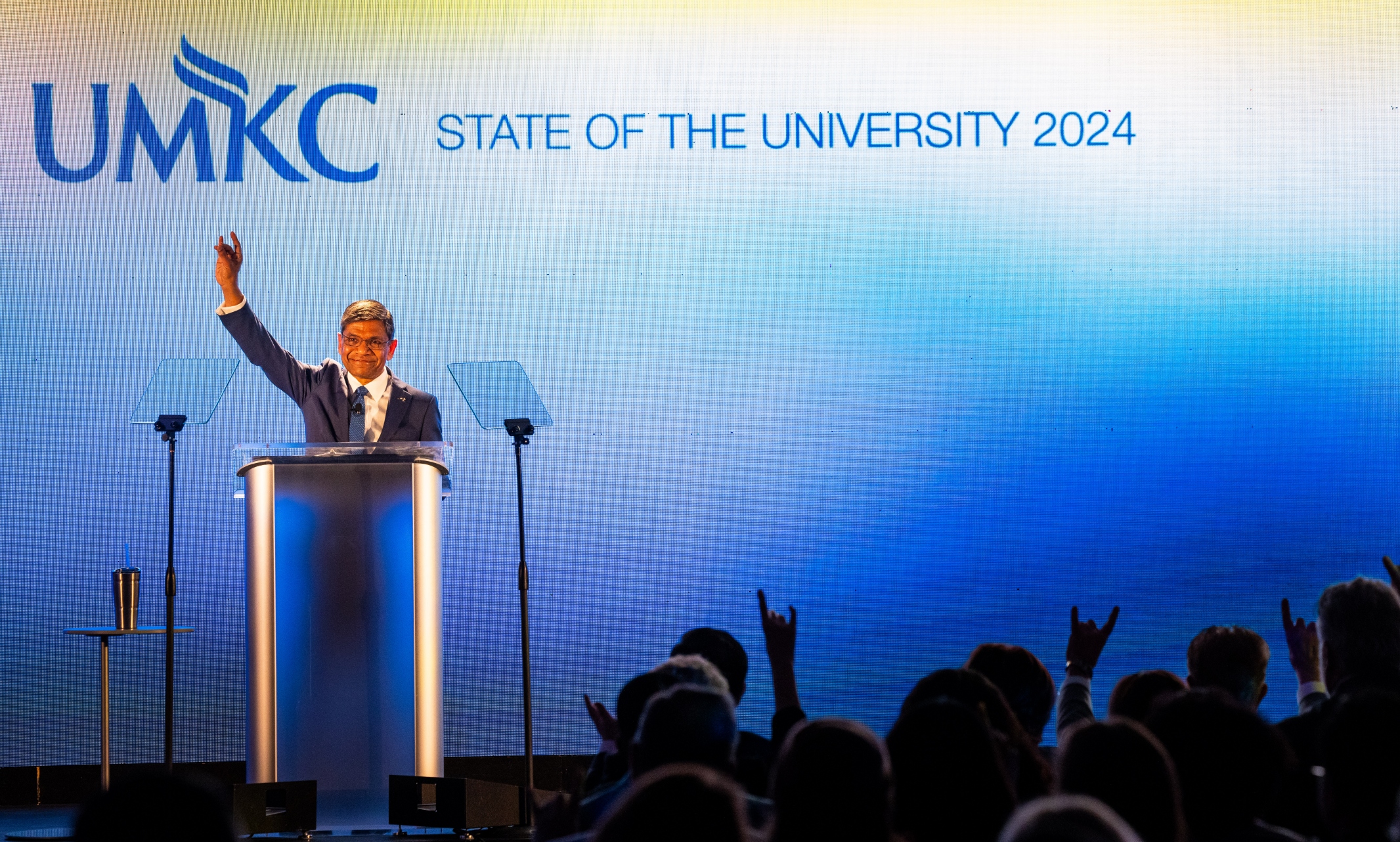
Chancellor announces research achievements, student-success milestones and major building initiatives
UMKC Chancellor Mauli Agrawal delivered the annual State of the University address on April 3, highlighting the significant achievements Kansas City’s university has accomplished in the past year.
“Today, we bear witness to how we at UMKC are breaking the norm to create a transformative university that can change lives and push the boundaries of excellence,” Agrawal said. “In the next few years, we are poised to achieve the most elite level of research excellence, accelerate our students’ success, and we are literally changing the face of our campus with signature building projects that support our highest strategic goals.
“If excellence in everything we do, big or small, is our goal, then in the pursuit of excellence we can never be satisfied with status quo.”
1. Research
With recent, rapid growth in its research enterprise, UMKC anticipates achieving a Carnegie R1 designation in the next two to four years. To put that in perspective, only 146 universities out of 2,800 four-year institutions currently have R1 research status, putting UMKC into a prestigious group.
The R1 designation will make it easier to attract even more world-class faculty and students, and to receive more research funding and partnerships with other R1 institutions.
“It will accelerate the creation of new knowledge to serve society and to enrich our students’ classroom experiences, and exposing students to high-quality research is a proven way to enhance their career outcomes,” Agrawal said. “Our students, graduate and undergraduate, deserve the very best. And the same could be said for our community.”
UMKC is Kansas City’s only public research university and has played a crucial role in various Missouri research projects including major roles in two tech hub designations from the U.S. Economic Development Administration, which hold the potential to unlock hundreds of millions in research funding for UMKC, the University of Missouri System, Missouri and Kansas.
2. Student Success
UMKC achieved several milestones in student success during the 2023-24 academic year including:
The largest class of first-time college students in UMKC history in 2023, success it hopes to continue in Fall 2024
Significant increases in transfer student applications for Fall 2024
Increases in domestic graduate student enrollment
Highest student retention and graduation rates in a decade, thanks to innovative new programs like First Gen Roos, which gained national recognition when the Center for First-Generation Student Success named UMKC a First Scholars program, the center’s second-highest designation
UMKC is also rolling out new degree programs in the next year, creating degrees of high relevance to students that also capitalize on key community strengths and workforce needs.
Upcoming programs going through final approvals and preparation include:
A bachelor’s degree in architecture in the School of Science and Engineering, starting in 2025.
A Master of Legal Studies program through the School of Law.
Eight new Ph.D. programs in electrical engineering, computer engineering, civil engineering, computer science, economics, education, humanities and natural sciences starting in Fall 2025.
3. Major Building Initiatives and Updates
UMKC plans major changes to its physical facilities to meet key strategic goals. Here are some of them:
Healthcare Delivery and Innovation Building
UMKC will begin construction in June on the $120 million Healthcare Delivery and Innovation Building, the largest capital in its history, when it begins clearing out a parking lot at 25th and Charlotte. A celebration is planned for this September. This building -- home to combined space for dental and medical programs as well as research space for health equity, biomedical engineering and data analytics center -- is scheduled to open in 2026.
Foodiverse
After the spring semester ends, food service in the Student Union, with the exception of Starbucks, will close to make way for the Foodiverse. Opening in January 2025, this food venue will have more options, from a grill and salad bar to pasta and an allergen-free zone. Chick Fil A will reopen in January 2025, too.
Student Success Space
Work on new student success space will begin this summer on fourth floor of the Miller Nichols Library. Programs including Supplemental Instruction and Academic Support and Mentoring, will move to that new space.
Pedestrian Plaza
51st Street between Cherry Street and Rockhill Road will open as a pedestrian plaza this fall, providing campus and community gathering and green spaces.
Streetcar Stop
The Kansas City Streetcar will pull up to the UMKC front door in mid-2025. UMKC is working on plans for retail and a possible arena space near this public transportation hub.
UMKC School of Medicine-St. Joseph Campus
A grand opening for a medical education building on the UMKC School of Medicine-St. Joseph campus is slated for next year, expanding the university’s work in preparing the next generation of doctors for Missouri’s rural areas.
UMKC Conservatory Expansion
A sneak peek of a UMKC Conservatory expansion showed off future plans for enhancing the university’s performing arts programs.
4. Partnerships
The Chancellor celebrated UMKC’s move to think outside the norm when it comes to partnerships that benefit students. As one example: UMKC is a proud higher education partner with all four professional, major-league sports teams: the Kansas City Chiefs, the Kansas City Current, the Kansas City Royals and Sporting KC. These partnerships provide students with unique learning opportunities such as job shadowing, mentorship, internships and leadership development.
5. Strategic Engagement and Fundraising
This past fiscal year, UMKC broke its all-time record in annual philanthropic production with $94 million.
As for this fiscal year, UMKC already surpassed its annual goal of $45 million and that doesn’t count Giving Day, which broke a record for single-day giving by raising in excess of $430,000, more than triple last year’s total.
“As you know, our community’s support is so much more than dollars,” Agrawal said. “We have an incredibly dedicated cadre of top leaders from throughout Kansas City who freely share their time and energy to help make UMKC top-class."
Apr 03, 2024
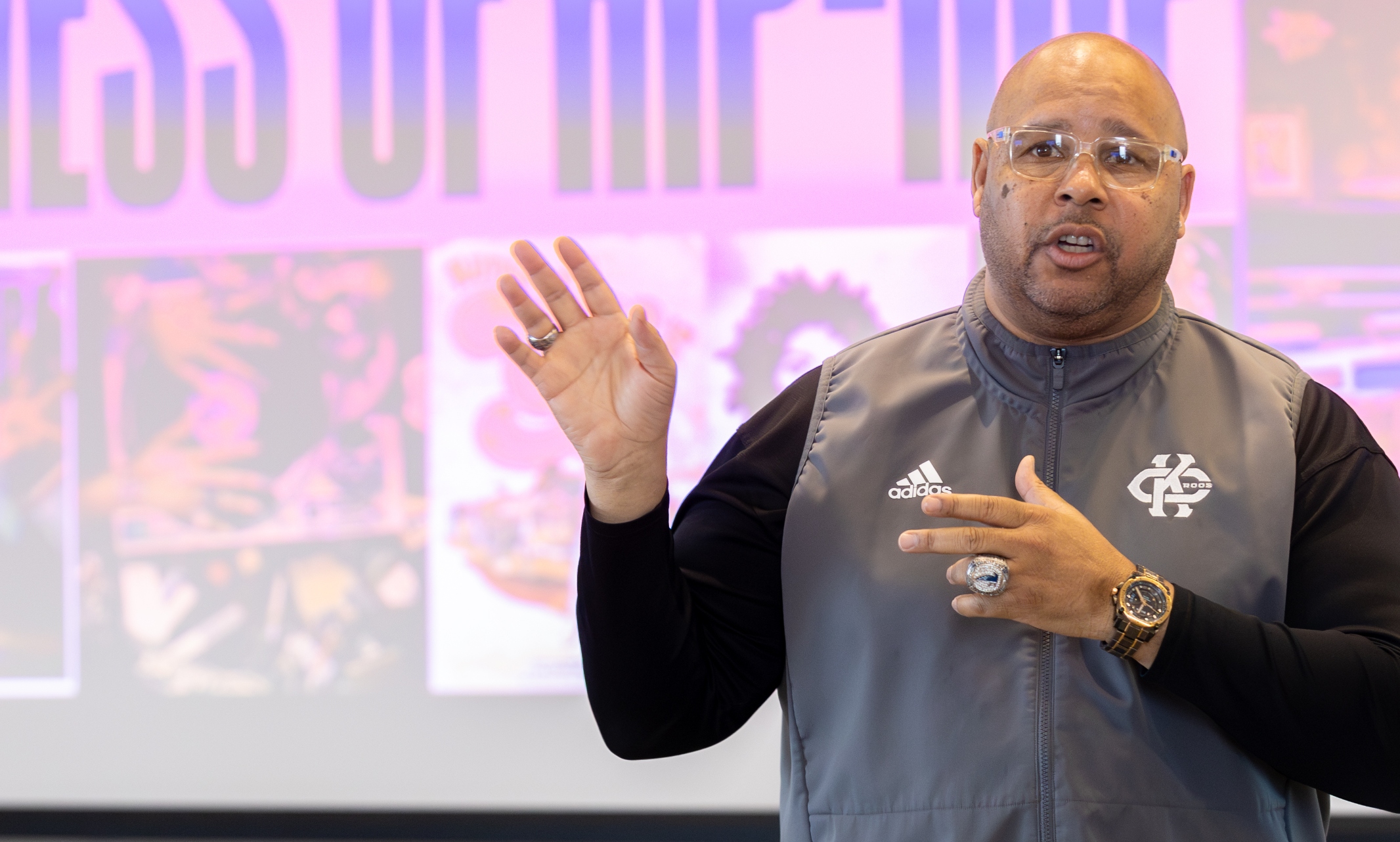
Harvard fellow, sports and media professionals collaborate to discuss influence and impact of hip-hop with students
No longer business as usual, the University of Missouri-Kansas City Henry W. Bloch School of Management continues to find new ways to educate and inspire students. Their latest move, the business of hip-hop. The music genre celebrated its 50th anniversary in 2023. What started with two turntables in a house party in the Bronx, is now a trillion-dollar industry.
The business of hip-hop is a collaborative effort among the Bloch School, UMKC Athletics and the UMKC Men of Color Academy (MoCa). More than 100 campuses worldwide teach courses on hip-hop culture and rap music; many of which speak to lucrative opportunities the genre brings across sports, fashion, food/beverage and the culture at large.
“The goal was really for students to see the different avenues that they could go into when it comes to sports and music and how our culture intertwines into our careers,” said Elizabeth Montelongo (BA ’21), program coordinator of student services and recruitment at the Bloch school.
Montelongo led the charge coordinating this new event, bringing in C. Keith Harrison, Ed.D., business professor at the University of Central Florida, and Nasir Jones, Hiphop Fellow at Harvard University, as keynote speaker.
“Hip-hop has dramatically evolved over the last 50 plus years,” Harrison said. “We’re teaching students about the success and risk-taking of hip-hop culture.”
Harrison speaks extensively on the intersection of hip-hop and business, and how many are using it to their advantage. Over its 50-year history, hip-hop has been used to solve business, health and educational challenges that lead to important change and awareness in communities.
This event also included panelists with a wide variety of backgrounds and experience. UMKC Alumna Shae Perry (B.A. ’19) who currently serves as morning host on Hot 103 Jamz in Kansas City, Felicia Martin senior vice president of inclusion education and community engagement at the NCAA, Jeff Porter, Ph.D., vice president of corporate partnerships at the Kansas City Current and Bryan Boots, Ph.D., managing director at the Regnier Institute for Entrepreneurship and Innovation.
Together, this panel helped students navigate questions surrounding business opportunities in sports and music and how to inspire young people who interact with students through the Bloch Mentorship Program. The latter is something Harrison believes is achieved through good professional role models in these fields, not just artists and athletes.
“Seeing images of the successful humans in hip-hop and sports, in addition to and beyond rappers and athletes is key, especially black Americans and other folks of color,” Harrison said.
And while not everyone who dreams of life as a professional athlete or artist will make it, it’s important not to put out the spark in young people who aspire for more.
“Even though we can think a dream is unrealistic, it’s important not to clip anyone's wings and allow them to fly and be a support system to them,” Montelongo said.
The Business of Hip-Hop will return in the 2024-25 academic year, with hopes of bringing high school students to the conversation.
Apr 01, 2024
